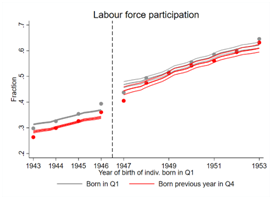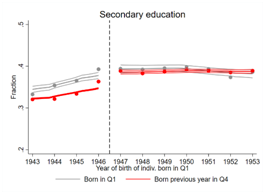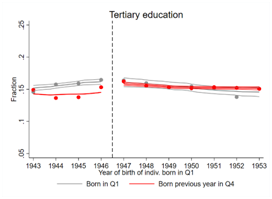Summary
Using data from Poland, we show evidence that political indoctrination at school reduces education attainment and labour force participation later in life. The effects seem to operate through reducing individual agency.
dr Anna Nicińska, analityczka DELab UW
Political indoctrination at school in Poland: A Case Study
Political indoctrination at school is often designed to influence trust in government and serve political motivations. Cantoni et al. (2017) show that indoctrination at school can be instrumental to the consolidation of political power, while Zhang et al. (2014) show that ideology in curricula can successfully instill socially useful beliefs and cultivate good citizenship. However, teaching individuals to accept beliefs uncritically might also exert negative effects on later life. The absence of critical and aesthetic discourse in education hinders the instillation of self-direction and individual agency (Torbert, 1978), which enhances most efficient choices on one’s career path (Hall et al., 2018) leading to professional excellence through adjusting individuals’ identities and values (Barro, 2001; Aspachs-Bracons et al., 2008). While other studies point to increased labour market participation and earnings (Woessmann et al., 2022) as a result of compulsory religion education in German schools, apart from anti-semitism spread due to Nazi schooling (Voth and Voigtländer, 2015), little is known about the long-lasting effects of political indoctrination at school. Our recent study (Costa-Font, García-Hombrados, Nicińska, 2024)shows that, relative to a year in education in the pre-reform educational system, an additional year of education in the school system with reduced indoctrination improved the probability of finishing secondary and tertiary education by 1.15 and 1.42 percentage points (pp) respectively, and increased labour force participation by 1.69 pp nearly 50 years later
A canonical example of an educational system with the heavy load of political indoctrination was the one established in by the People’s Republic of Poland following the end of the World War II. By 1949, the education system in Poland had stabilized after the war disruptions and adopted the Soviet approach to the education aiming at instilling Marxist-Leninist values and shaping loyal to the regime, physically fit and strongly attached to the Soviet community the so called “new Soviet men”. Following the death of Joseph Stalin in the spring of 1953, the government of Poland reduced dramatically the amount of indoctrination in the school curriculum and grading system from the school course 1954/55. The removal of political indoctrination elements affected the curricula of all school courses, from history, Polish language, and mathematics, to musical, technical, and physical education. No longer the school assemblies were dedicated to communist leaders nor required the participation of all pupils in reciting ideological poems or singing communist anthems. The grading system after 1954/55 did not reward demonstrations of the assimilation of the ideological contents nor required learning by a heart set of responses centrally coined by the experts responsible for communist schools. See a video on the primary schools in Poland from 1952 official chronicles used by state propaganda, that depict a poster with a 6‑year plan in a classroom for first-grade pupils and how it is used to reward children’s school efforts: http://www.repozytorium.fn.org.pl/?q=pl/node/7009.
In a recent study with Jorge García-Hombrados and Joan Costa-Font, we show that nearly 50 years later children affected by the 1954/55 reform in school curricula were more likely to participate in labour market and more likely to obtain higher levels of human capital, i.e. education levels in their later life. Specifically, the study shows that one additional year of revoked indoctrination in school improved the probability of finishing secondary and tertiary education by 1.15 and 1.42 percentage points (pp) respectively, and increased labour force participation by 1.69 pp nearly 50 years later. The study explores mechanisms that might yield the detrimental effects of communist education, documented also in a seminal study by Fuchs-Schundeln and Masella (2016) exploring the division of Germany. Results suggest that values explicitly and also implicitly promoted at school might be critical for later life outcomes, especially individuals’ sense of agency and independence from authorities. Political regimes affect curricula contents, and autocratic elements in schooling seem to limit the benefits of education in a long run.
Figure 1: Human capital and labour force participation for individuals born in the first quarter of the year and the last quarter of the previous calendar year



Source: 2002 Polish census.
Note: The graphs compare the evolution of labour force participation, the share of individuals that completed secondary, and the share of individuals that completed tertiary education for those born in the first quarter of the year and for those born in the last quarter of the previous calendar year. The year indicated in the X‑axis refers to the year of birth for those born in the first quarter and to the year of birth +1 for those born in the last quarter of the previous calendar year. Lines represent fits from a local polynomial with a bandwidth of 1 and 95% confidence intervals.
Table 1: Effect of the 1954/55 reform on education and labour force participation (Census data)
| Labour force participation | Secondary education | Tertiary education | ||
| Q1 x In school | 0.014*** | 0.017*** | 0.011*** | |
| (0.005) | (0.005) | (0.003) | ||
| Q1 | 0.014*** | 0.008*** | 0.002 | |
| (0.003) | (0.003) | (0.002) | ||
| Observations | 198200 | 200706 | 200706 | |
| Cut-off of reference FE | YES | YES | YES |
Note: This table reports the difference-in-differences estimates of the effects of an additional year of exposure to the post-reform educational system on labour force participation, the probability of completing secondary education, and the probability of completing tertiary education relative to a year of education in the pre-reform educational system during compulsory education. Robust standard errors are reported in parentheses.*** p<0.01, ** p<0.05, * p<0.1.
Source: 2002 Polish census.
The study relies on the 2002 Polish census data on the labour market participation and human capital attainment for 200,706 individuals. We use a difference-in-differences strategy comparing individuals born in the year’s first quarter and the last quarter of the previous calendar year. Despite being born just a few weeks later, individuals born in the first quarter of the year start school one year later and therefore were exposed to one additional year of education under the post-reform educational system. To net out the effect of an additional year of education from the effect of just being “old” in the school cohort, we introduce a second dimension of variation including in the sample individuals that initiate school already after the reform. For these individuals, being born in the first quarter of the year does not imply a different level of exposure to the reform relative to those born in the last quarter of the previous calendar year.
Table 2: Effect of the 1954/55 reform on self-direction and agency
| Dependence on: | Self- | |||
| authorities | Others | destiny | reliance | |
| Q1 x In school | -0.050* | 0.003 | 0.027 | 0.097** |
| (0.027) | (0.038) | (0.049) | (0.047) | |
| Q1 | -0.050 | -0.145 | 0.231** | 0.118 |
| (0.073) | (0.091) | (0.104) | (0.090) | |
| Observations | 1789 | 1789 | 1789 | 1789 |
| Cut-off FE | YES | YES | YES | YES |
| Survey FE | YES | YES | YES | YES |
| Age | YES | YES | YES | YES |
| Sex | YES | YES | YES | YES |
Note: This table reports the difference-in-differences estimates of the effect of an additional year of exposure to the post-reform educational system on self-direction and agency outcomes relative to a year of education in the pre-reform educational system during compulsory education. All dependent variables are dichotomous variables. Robust standard errors are reported in parentheses.*** p<0.01, ** p<0.05, * p<0.1.
Source: Diagnoza Społeczna, waves 2011, 2013, and 2015.
We then use the Diagnoza Społeczna survey explore whether the effect might be driven by the effect of the reform on different values. The latter database includes rich information in the measures of values and attitudes, though significantly smaller in terms of the sample size than the census set. Table 2 shows the significant causal effects of the 1954/55 education reform, suggesting that individuals exposed to reduced school indoctrination tend to place the responsibility for their overall life circumstances in themselves to a larger degree and in the authorities to a smaller degree than those with additional political indoctrination at school. The sense of greater agency and independence from authorities could have been shaped with the school curricula more focused on scholar activities and skill acquirement than on rewarding obedience to authorities and demonstration of loyalty to the communist regime. These in turn, appear to be associated with the ability to shape one’s own destiny, which aligns with the observed increases in labour market participation and human capital attainment. On the other hand, we do not find any relevant effect on leftist views.
Implications
Whether political indoctrination in non-communist autocratic regimes would yield similar negative effects is an open question. While more research is needed to convincingly address this question, the fact that the negative effects of Marxist-Leninist indoctrination seem to be tied to the suppression of individual agency suggests that these results might be applicable in autocratic regimes across the entire political spectrum, which often set educational system to instill obedience to the regime (Diwan and Vartanova, 2020; Dahlum and Knutsen, 2017).
References
Costa-Font J., García-Hombrados J., Nicińska A., Long-lasting effects of indoctrination in school: Evidence from the People’s Republic of Poland,
European Economic Review, Volume 161, 2024, 104641, https://doi.org/10.1016/j.euroecorev.2023.104641
Dahlum, S. and Knutsen, C. (2017). Do democracies provide better education? Revisiting the democracy-human capital link. World Development, 94.
Diwan, I. and Vartanova, I. (2020). Does education indoctrinate? International Journal of Educational Development, 78.
Fuchs-Schundeln, N. and Masella, P. (2016). Long-lasting effects of socialist education. The Review of Economics and Statistics, 98(3):428–441).
Hall, D. T., Yip, J., and Doiron, K. (2018). Protean careers at work: Self-direction and values orientation in psychological success. Annual Review of Organizational Psychology and Organizational Behavior, 5:129–156.
Torbert, W. R. (1978). Educating toward shared purpose, self-direction and quality work: The theory and practice of liberating structure. The Journal of Higher Education, 49(2):109–135.
Voth, H.-J., Voigtländer, N. (2015) Taught to hate: How Nazi schooling amplified anti-Semitism in Germany. VoexEU.org, June 18 https://cepr.org/voxeu/columns/taught-hate-how-nazi-schooling-amplified-anti-semitism-germany.
Woessmann, L., Zierow L., Arold B. W. (2022). Religious education in school affects students’ lives in the long run. VoexEU.org, March 3 https://cepr.org/voxeu/columns/religious-education-school-affects-students-lives-long-run.
Zhang, J., Yuchtman, N., Chen, Y., Yang, D. Y., Cantoni. D. (2014) Curriculum and ideology. VoexEU.org, May 29 https://cepr.org/voxeu/columns/curriculum-and-ideology.




